|
DEMOSTHENES
(384-322 BC):
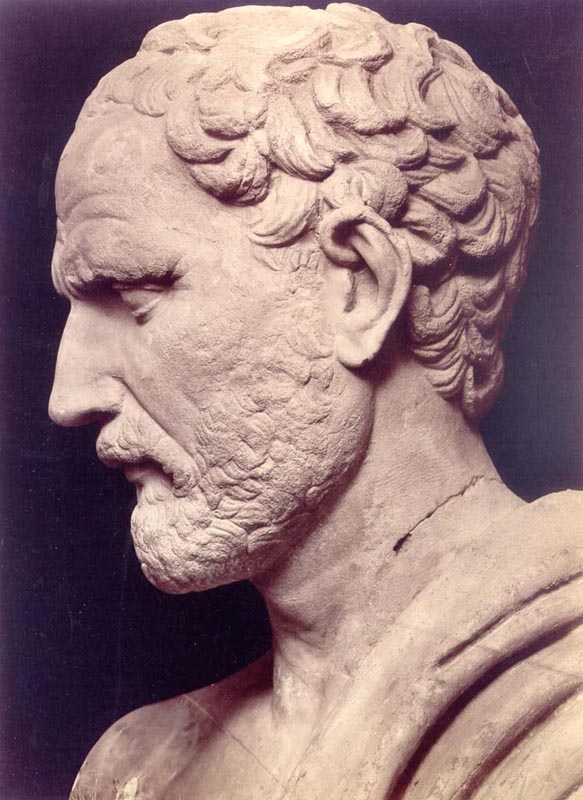
Demostehenes
Demosthenes
was born in Athens in 384 and died in the island of Poros
in 322 BC. He is considered the perfect orator (by Cicero).
He was a professional speech writer (a logographer), a lawyer, a statesman,
and even an actor. Politically he remained steadfast in his defense
of Athenian liberty and democratic government. Hence, he opposed
the expansionist and centralist policies of King Philip II (359-336
BC) of the northern Kingdom of Macedonia, as well as the imperialist
policies of his son Alexander the Great (336-323 BC). Demosthenes'
speeches cost Athens dearly, for they merely prolonged Philip II's ambitions
to conquer the entire city-states of Greece. However, he never lost
the support or the love of the Athenians. In 336 BC, an orator
named Ctesiphon proposed to honor Demosthenes with the bestowal
of a golden crown for his virtue (services to the state).
Another famous orator and statesman, Aeschines (389-314 BC), a pragmatist
who had previously been won over by Philip II and, consequently, was attacked
and denounced by Demosthenes, opposed Ctesiphon's proposal on three legal
grounds. In his famous speech Against Ctesiphon, Aeschines
claimed that Ctesiphon's motion was illegal because: 1) The Code of
Solon forbade crowning a public official until the expiration of his
term in office (and Demosthenes had been commissioned at that time to repair
the walls of the city and to supervise the Dionysian Festival Funds); 2)
The law prescribed that golden crowns could only be bestowed by the city
in a public assembly on the Pnyx (a hill in Athens where the Ecclesia
[assembly of the democracy of ancient Athens] met) [Ctesiphon had suggested
that the crown be bestowed at the theater on the occasion of the new tragedies
of the Dionysia], and 3) Ctesiphon had brought false statements
in his motion by asserting that Demosthenes had always been a patriotic
and useful citizen. At this time, Thebes and Sparta
had been destroyed by Alexander; hence, to honor Demosthenes (who had opposed
Philip and Alexander) would have angered the new powers even more than
necessary. The motion was delayed for six years. When
it was finally brought to court in August, 330 BC (to a jury of
500 Athenian citizens), Demosthenes responded with his most famous judicial
speech, On the Crown. Aeschines, the prosecutor, lost the
case (he failed to get the votes of 1/5 of the jury). A year later
Demosthenes received his crown and Aeschines, who suffered opprobrium,
moved to Rhodes, where he founded a school of rhetoric (Aeschines,
like Demosthenes, belongs to Greece's "Alexandrian Canon" or the
"Canon of Ten" Attic Orators, a list of the greatest orators of
Greece's classical period [510-323 BC or 187 years], which includes Isocarates
and Isaeus, two of Demosthenes' teachers]), and later to Samos,
where he died. In his private life, Demosthenes seems to have been
at times corrupt (he apparently took bribes and was guilty of larceny),
was a somewhat opportunistic pederast (he used wealthy boy lovers for their
money), and a cowardly man in matters of war (he was accused of desertion).
After Alexander's death, Antipater, his successor, requested the
rendition of Demosthenes. The Athenian Ecclesia subsequently
condemned anti-Macedonians agitators to death. Demosthenes escaped
to Poros and, upon being found, committed suicide by poison.
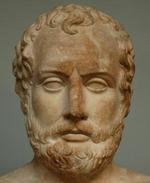
Aeschines.
British Museum. London.
DE CORONA (ON THE CROWN)
[330 BC]:
EXORDIUM (pp. 1-8):
Notice the many
instances of captatio benevolentiae: "Men of Athens."
He seeks "benevolence towards me." Demosthenes prays for the
Atehnians, their conscience, and their honor. Demosthenes discusses
the impartial hearing, the lack of prejudice. Demosthenes asks that
he be granted the favor of arranging his speech according to his discretion
and judgment. He fears loss of favor, kindness, and goodwill.
He is concerned equally with Ctesiphon in these proceedings.
He asks to be listened to and for them to proceed with justice.
He appeals to Solon, "a good democrat and friend of the people."
He alludes to the calumnies of the prosecutor (Aeschines).
PROTEST AGAINST IRRELEVANT CHARGES (p. 9):
Aeschines has brought
false accusations and irrelevant topics.
REPLY TO CHARGES AGAINST PRIVATE LIFE (pp. 10,
11):
Demosthenes will
give an honest and straightforward reply. He is also a better man
and better born.
INTRODUCTION TO DISCUSSION OF PUBLIC POLICY (pp.
12-17):
Aeschines has brought
malicious charges, denouncing him, Demosthenes, but indicting Ctesiphon.
Aeschines' accusations are dishonest and untruthful, reflecting more the
prosecutor's faults than Demosthenes' crimes.
FIRST PERIOD: THE PEACE OF PHILOCRATES (346
BC) [pp. 18-52]:
Allusion to the
Phocian
War (355–346 BC), which ended with Philip II's destruction of Phocis.
Phocis, Thebes, and other Greek city-states were experiencing
strife and confusion. Philip II of Macedonia observed those
conditions, bribed traitors, and tried to promote embroilment and disorder.
The Thessalians and Thebans saw Philip II as their friend,
benefactor, and deliverer. Demosthenes opposed Philip II,
but Aeschines did not, nor did he oppose Demosthenes. Now he bewails
the fate of those city-states that have lost their independence.
But no more should be said of this matter (notice the aposiopesis).
INTRODUCTION TO CHARGES RELEVANT TO THE INDICTMENT
(pp. 53-59):
Demosthenes reads
Aeschines' indictment against Ctesiphon (whom Demosthenes is defending):
1)
It is false that Demosthenes has consistently shown good will to Athenians
and Greeks to merit a golden crown. 2) It is illegal to crown
someone subject to audit (Demosthenes was then Commissioner of Fortifications
and a trustee of the Theatrical Fund). 3) It is illegal to
crown someone at the Theater of the Dionysia instead of the Council-house
(the Ecclesia) on the Pnyx.
SECOND PERIOD: THE RENEWAL OF WAR (340 BC) [pp.
60-109]:
Demosthenes asks
Aeschines what the duty of Athens was when she perceived that Philip's
purpose was to establish a despotic empire over all Greece. Philip
was committing injustices, breaking treaties, and violating the terms of
peace. He, Demosthenes, stood in his way and warned and admonished
the Greeks to surrender nothing. And yet, the peace was broken (and
not by Athens) when Philip seized some merchant men. The People resolved
to send ambassadors to Philip concerning the removal of the vessels (which
Philip eventually lets go). However, even he, Philip, did not blame
Demosthenes in respect to the war (although the king blames others).
As far as the crown is concerned, Demosthenes says no dishonor, contempt,
or ridicule has befallen the city. The decree shows the gratitude
of Athens to Demosthenes, not censure. Philip then tried to control
the carrying trade in corn, which the Athenians consume in greater quantities
than other nations. Demosthenes is proud of his refusal to compromise.
Demosthenes has maintained the same character in domestic and Hellenic
affairs. At home he never preferred the gratitude of the rich to
the claims of the poor; in foreign affairs he never coveted the gifts and
friendship of Philip rather than the common interests of all Greece.
REPLY TO THE TWO MINOR COUNTS (pp. 110-25):
Demosthenes has
created good policies and has been the people's friend. It should
perhaps be illegal for men holding office in government to make presents
to the government. Demosthenes held office and was audited for his
offices though not for his gifts (which he had given the state in the form
of a donation). Demosthenes reads a decree where he is commended
for his donations; yet that is not mentioned in the indictment. Acceptance
of gifts, hence, is legal (like Demosthenes giving donations to the state),
but gratitude for gifts is illegal and grounds for indictment. Aeschines
is dishonest and malignant. Aeschines should be ashamed for prosecuting
for spite, not for crime. An accusation implies crimes punishable
by law. Is Aeschines the enemy of Athens or of Demosthenes?
Aeschines poses as Demosthenes's enemy, but is he not the enemy of the
people?
ATTACK ON THE PRIVATE CHARACTER OF AESCHINES (pp.
126-31):
Aeschines
is the son of Tromes, a slave. His mother Glaucothea
was not as the Banshee for the pleasing diversity of her acts and
experiences. Aeschines was raised from servitude to freedom by the
favor of his fellow-citizens, whom he has betrayed to the enemy, to their
detriment.
ATTACK ON THE PUBLIC MISDEEDS OF AESCHINES (pp.
132-38):
Demosthenes reads
a decree wherein is stated that Aeschines came at night to the house of
Thraso
to communicate with Anaxinus, a proven spy from Philip II of
Macedon. Aeschines is helping the enemy and maligning him, Demosthenes!
Demosthenes says he omits thousands of stories he could tell about him
(notice the paralipsis or ocultatio).
ATTACK ON AESCHINES' PROVOCATION OF THE AMPHISSIAN
WAR (339 BC) [pp. 139-59]:
Demosthenes states
that by false reports, Aeschines contrived the destruction of the Phocians.
The war at Amphissa that brought Philip to Elatea and ruin
to Greece was also caused by Aeschines. Demosthenes protested to
no avail. Philip needed to make Thebes and Thessaly
the enemies of Athens. Philip hired (bribed) Aeschines
as his Athenian representative to carry out his conquests with Aeschines's
favor. War against the Amphissians was provoked. Aeschines
is responsible for providing Philip with the right pretexts to invade and
destroy the Greeks. Do not blame Philip alone, but all the other
traitors from the city-states who sided with Philip, including Aeschines
THIRD PERIOD: THE BATTLE OF CHAERONEIA (338 BC)
[pp. 160-87]:
The Battle of
Chaeroneia (338 BC) was fought between Philip II of Macedonia
and an alliance of sundry Greek city-states, the principal being Athens
and Thebes. It resulted in a decisive victory for Philip
and Macedonia. Demosthenes claims that he alone among Athens'
orators did not desert the post of patriotism in the hour of peril.
Demosthenes suggested an alliance between Thebes and Athens,
since the Athenians and the Thebans have always had good relations.
Demosthenes' suggestion was applauded and followed.
GENERAL DEFENSE OF THE ATHENIAN POLICY OF RESISTANCE
(pp. 188-210):
Demosthenes states
that he should not be accused of crime because Philip won the battle, for
the event was in God's hands, not his. Demosthenes' deliberation
then (to unite with Thebes against Philip) was a sound and honorable one.
Things might have been worse if Athens had fought alone or if Thebes had
sided with Philip against Athens. If Aeschines had not approved of
this policy then he should have spoken, but he didn't. Demosthenes
behaved honorably; Aeschines did not. Demosthenes' deliberation was
unanimously approved by the Athenians, also. Hence, Aeschines's attack
on Demosthenes is also an attack on all Athenians. And even if Aeschines
had suggested a different policy (one of conciliation or alliance with
Philip), Athens would have followed the honorable course. Had Athens
sided with Philip she would have betrayed Greece and freedom. But
that is not part of Greek character (servility or betrayal). To condemn
Ctesiphon for suggesting that the Greeks should honor an honorable man
(Demosthenes) would be tantamount to condemning all Greece.
THIRD PERIOD RESUMED (pp. 211-51):
The Athenians assisted
the Thebans, and, hence, war damages did not ensue to Athens. Philip
is a despotic ruler and an autocrat. Demosthenes' only weapon to
defy Philip was his public speaking, by which he created alliances between
Athens
and the Euboeans, Achaeans, Corinthians,
Thebans,
Megarians,
Leucadians,
and Corcyraeans. They provided 15,000 infantry
and 2,000 cavalry, not counting the citizen-soldiery.
[NB: Philip II's phalanx formation consisted of 16,384 soldiers].
And Athens contributed twice as much than anybody else to the common deliverance.
Demosthenes also was sent as a representative to talk to Philip, but he
was not corrupted by him, as was Aeschines. Philip was successful
on account of his superior army, his bribery of ambassadors, and his corrupting
of politicians. Demosthenes did his job as ambassador honestly and
without corruption.
RENEWED ATTACK ON THE LIFE AND CHARACTER OF AESCHINES
(pp. 252-75):
Demosthenes believes
it is a stupid thing to reproach one's fellow man on the score of fortune.
Demosthenes claims that in his boyhood, he, Demosthenes, had the advantage
of attending respectable schools. When he came of age, his circumstances
were in accordance with his upbringing. He rendered good service
to the commonwealth. Even his enemies thought he, Demosthenes, was
honorable. But Aeschines was born in abject poverty and not holding
the position at first of a free-born boy. He was a clerk and errand-boy
to minor officials. But Demosthenes will omit other things about
Aeschines's life so as not to discredit himself. Aeschines has served
the enemies of Greece; Demosthenes has served his country. In private
life, Demosthenes has been generous and courteous, has ransomed captives
and provided dowries as a matter of principle. Fate can overturn
good intentions and honorable causes; yet, Aeschines is savage and malignant
in turning misadventures into crimes.
REPLY TO THE IMPUTATION OF RHETORICAL ARTFULNESS
(pp. 276-84):
Demosthenes has
exercised his skill in speaking on public concerns and for the advantage
of the Greeks, not on private occasions and for their detriment.
But Aeschines is peevish and seems to have gone to school not to get satisfaction
for any transgression but to make a display of his oratory and vocal powers.
But
diction and vigor are of no value if they are not used to support the policies
of the people. As soon as Philip won the war, Aeschines went
to see him and sided against the interests of his countrymen. Who
is then the traitor?
CLAIM THAT THE ORATOR'S PUBLIC ACTS HAD ALREADY RECEIVED
THE APPROVAL OF THE PEOPLE (pp. 285-96):
When the city wanted
a speaker to honor the slain soldiers at war, they chose Demosthenes over
Aeschines. Moreover, Aeschines when he recounted the disasters that
befell the city of Athens, expressed no feelings and shed no tears.
Thus he showed his inability to sympathize with the sorrows of the common
people. People like Aeschines and his followers are traitors and
sycophants who measure their happiness by their belly and baser parts while
they betray forever the freedom and independence of the Greeks.
EPILOGUE AND RECAPITULATION (pp. 297-323):
Demosthenes has
been upright, honest, and incorruptible. He administered in all purity
and righteousness. He built fortifications for the protection of
the city and made provision for the passage of corn-supply. If fate
intervened against the destiny of Athens, is he, Demosthenes guilty?
Had fate intervened positively, Demosthenes' policies would have brought
the country's well-being, alliances, revenues, commerce, and good legislation.
But what alliances does Athens owe to Aeschines? What war-galleys,
or munitions, or fortifications? "Of what use in the wide world are
you?" Aeschines never contributed anything positive towards the state.
Demosthenes has proven himself to be the better patriot. There are
two traits that mark a solid citizen: honor and loyalty.
Demosthenes never renounced his loyalty to Athens and always chose honor.
SHORT PERORATION (p. 324):
Demosthenes appeals
to the Powers of Heaven to grant the citizens a better purpose and spirit.
Should that not be possible, Demosthenes asks for the destruction of the
unworthy and a speedy deliverance for those who remain.
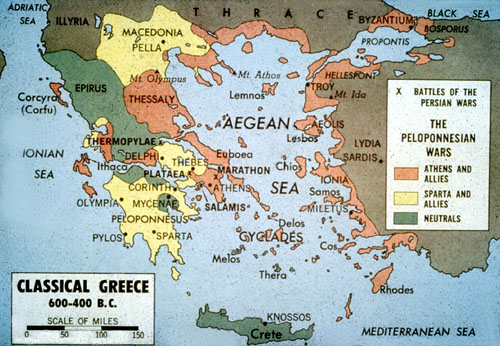
Classical Greece
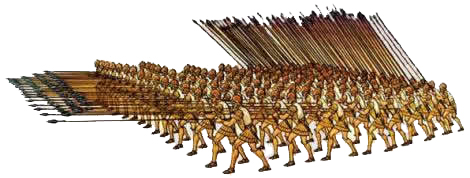
Philip II's Phalanx Formation
(with sarissa lances [6 m. long])
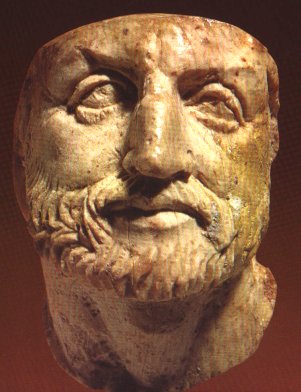
Philip II of Macedonia
|

Alexander the Great
|
Page created by
A. Robert Lauer

arlauer@ou.edu
12 Nov. 2014
|





